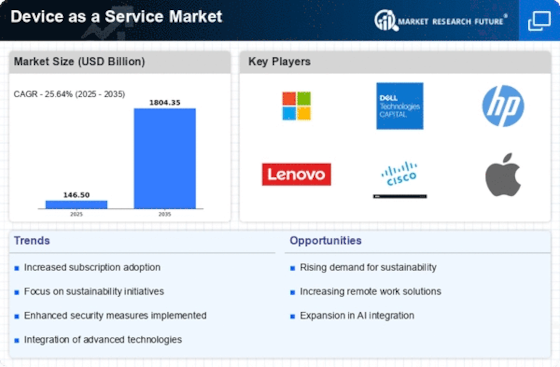Top Industry Leaders in the Device as a Service Market

Competitive Landscape of Device as a Service Market: A Comprehensive Overview
The Device as a Service (DaaS) market is experiencing explosive growth, driven by factors such as the increasing adoption of subscription-based models, the rise of remote work, and the need for secure and flexible device management. This dynamic landscape presents both challenges and opportunities for existing players and emerging companies alike.
Key Players:
HP Development Company, L.P (US)
Microsoft Corporation (US)
Dell Inc. (US)
Amazon Web Services Inc. (US)
Lenovo (Hong Kong)
Citrix Systems, Inc. (US)
Plantronics, Inc. (US)
CompuCom Systems, Inc., (US)
Capgemini (France)
SHI International Corp. (US)
- IT giants: Dell Technologies, Hewlett Packard, Lenovo, Cisco, and Apple hold significant market share due to their established brand names, extensive product portfolios, and strong global presence. They offer a comprehensive DaaS solution encompassing hardware, software, and support services.
- Telecom giants: Verizon, AT&T, and T-Mobile are leveraging their existing customer base and network infrastructure to offer bundled DaaS solutions. They cater to the growing demand for connectivity and mobility solutions.
- Managed service providers (MSPs): Companies like Accenture, Cognizant, and Computacenter are capitalizing on their expertise in IT management and service delivery. They offer DaaS solutions tailored to specific industry verticals and cater to small and medium-sized businesses (SMBs).
- Specialized DaaS providers: Companies like Flexera, Varrow, and Carahsoft are focusing on niche markets or specific device types. They offer unique features and functionalities to differentiate themselves from established players.
Strategies Adopted:
- Portfolio expansion: Key players are expanding their DaaS offerings by adding new device types, software applications, and service options to cater to diverse customer needs.
- Subscription model innovation: Companies are experimenting with various pricing models, such as tiered plans, flexible billing options, and usage-based pricing, to attract new customers and increase customer retention.
- Strategic partnerships: DaaS providers are partnering with OEMs, software vendors, and IT service providers to create comprehensive solutions and leverage each other's strengths.
- Focus on customer experience: Companies are investing in customer service and support infrastructure to ensure seamless device deployment, troubleshooting, and end-user satisfaction.
- Technological advancements: DaaS providers are incorporating AI, automation, and machine learning into their offerings to optimize device lifecycle management, improve security, and enhance user experience.
Factors for Market Share Analysis:
- Brand reputation and customer base: Established players with strong brand recognition and a large existing customer base have a significant advantage in the market.
- Product portfolio and service offerings: The breadth and depth of the DaaS solution, including hardware, software, support services, and customization options, plays a crucial role in attracting customers.
- Pricing and subscription models: Competitive pricing strategies and flexible subscription options can attract price-sensitive customers and promote long-term contracts.
- Global reach and regional presence: Strong geographic presence and localized solutions enable companies to cater to diverse customer needs across different regions.
- Technology investments and innovation: Companies that invest in advanced technologies and develop innovative features can differentiate themselves and gain a competitive edge.
New and Emerging Companies:
The DaaS market is attracting several new entrants, including startups and niche players, who are focusing on specific areas such as:
- Vertical-specific solutions: Companies are developing DaaS offerings tailored to the needs of specific industries, such as healthcare, education, and retail.
- Security-focused solutions: Companies are focusing on offering advanced security features, such as data encryption, multi-factor authentication, and endpoint protection.
- Sustainability-focused solutions: Companies are developing eco-friendly DaaS solutions with features like device reuse, recycling, and energy-efficient hardware.
- Blockchain-based solutions: Companies are exploring blockchain technology to enhance transparency, security, and efficiency in the DaaS lifecycle.
Current Company Investment Trends:
- Increased focus on R&D: Companies are investing heavily in research and development to improve existing DaaS solutions and develop innovative features.
- Acquisitions and partnerships: Mergers and acquisitions are becoming increasingly common as companies seek to expand their market share and acquire specialized expertise.
- Expansion into emerging markets: DaaS providers are expanding their operations into emerging markets with high growth potential, such as Asia-Pacific and Latin America.
- Investment in automation and AI: Companies are investing in AI-powered automation tools to streamline device management processes and improve operational efficiency.
- Focus on sustainability: Companies are increasingly focusing on sustainable practices, such as device recycling and eco-friendly packaging, to reduce their environmental impact.
Latest Company Updates:
September 2023-
NTT and Qualcomm have teamed together to launch a new Device-as-a-Service (DaaS) platform in 2023 with the goal of assisting businesses in managing their 5G-integrated Internet of Things (IoT) devices efficiently. Subscribers can access this platform on a monthly basis. It is supported by Qualcomm's knowledge of semiconductors and the development of 5G chipsets, as well as NTT's focus on private 5G. Configuration management, device updates, firmware testing, and other functions are all included in the subscription.
In 2023, the French all-in-one work equipment solution From Berlin, Fleet is growing and penetrating the German market. A full device-as-a-service (DaaS) for PCs, phones, tablets, accessories, and office furniture is provided by the B2B firm to businesses.
As a result of major market evolution in 2023, NordLayer has transformed from a basic business VPN to a cutting-edge network access security solution. In order to improve its service, NordLayer is taking into account the requirements and adoption of its clients. In-demand technologies like device posture security (DPS) and firewall as a service (FWaaS) will assist the product deliver accurate network security for certain corporate use cases and requirements.










